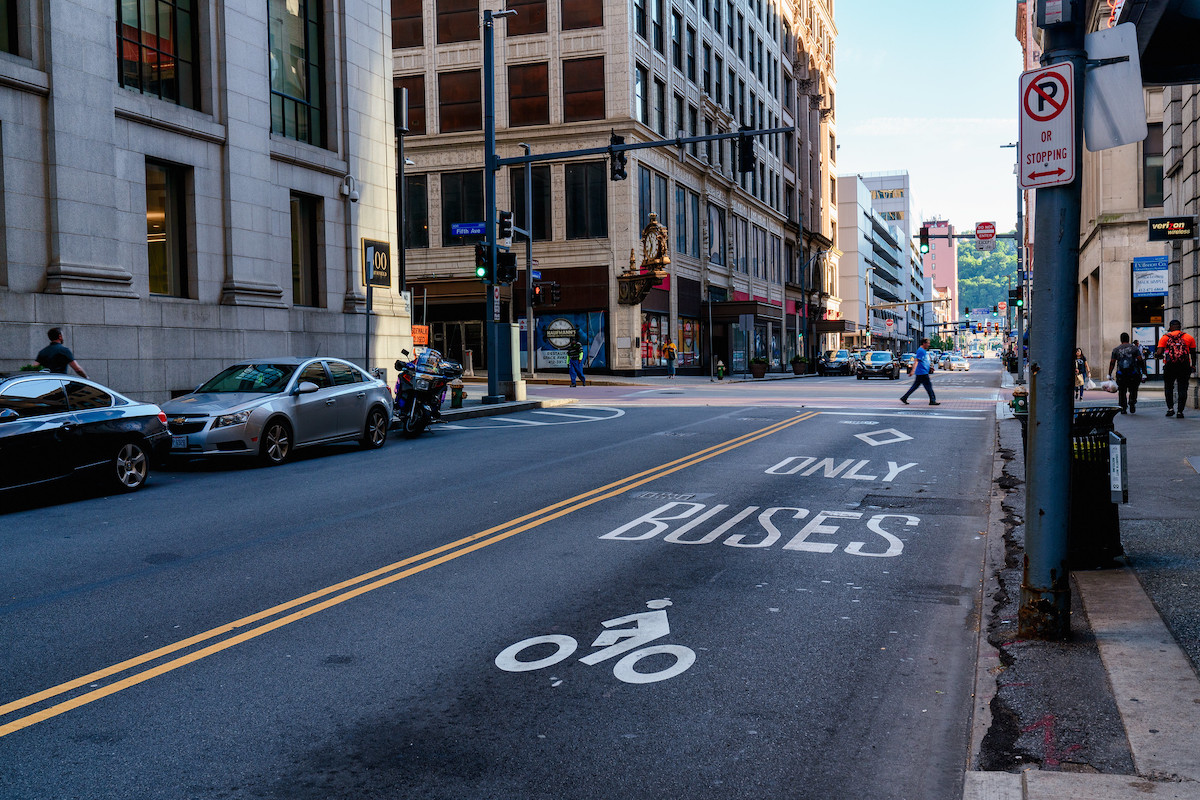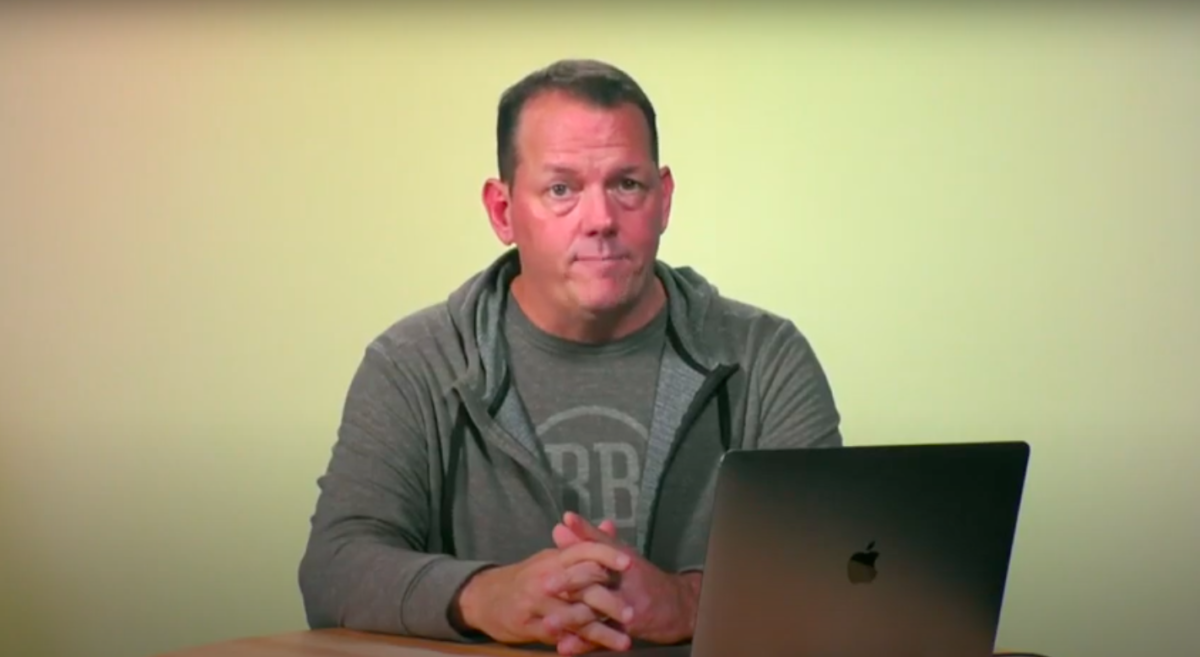Samii founded the tech company specializing in visualization tools for bike riders, in 2020 under the name Robot Armin. The startup has participated in the local PGH Lab and Ascender accelerators, and the 2023 RealLIST Startups honoree recently launched its Anti-Vibration Phone Mount which is used to mount smartphones on bicycle handlebars without blocking the camera.
RustBuilt Pittsburgh recently caught up with Samii to talk about Dashcam for your Bike’s new features, life as a solopreneur and the most useful advice he’s received. Read his full Q&A and watch the full interview below. The transcript of the interview has been edited for length and clarity.
1. How did you come to do this work and why is it important to you personally?
In 2019, I was biking on Butler Street. On my way to work, I was wearing a bright yellow vest. I had my headlights, my bicycle lights, even though it was sunny out. And I was hit by a truck — a pickup truck driver turned right across my path and injured me.
When the police arrived, they said, there’s no evidence that he hit me, and it’s possible that I rode my bike sideways into the side of his truck — which is not how bicycle wheels work. But I had no video evidence, and at the time, I didn’t realize I could do anything more. I was unable to get a police report which meant I had to pay out of pocket for my injuries and for my bike repair. So I realized the importance of video evidence at that time.
2. What was your lightbulb moment?
My light bulb moment was finding out that people do buy cameras. They pay hundreds of dollars for bicycle-mounted cameras, and oftentimes after a few months they actually stop using them — and it’s because they’re a hassle. Especially as a bike commuter, you can’t leave anything on your bike. Every time you park it outside, lock it up, you have to take the device with you. You have to constantly recharge it. It’s a pain to get the data off of those devices.
People were spending all of this money on these bicycle-mounted cameras and not actually using them, which is a business opportunity. If there’s money that’s being spent and people are unsatisfied with the existing products, that’s a business opportunity.
3. What is the elevator pitch for Dashcam for your Bike?
Related to the story I just told, the best bicycle camera’s the one that actually gets used. And the one that gets used is gonna be the one you have with you. And that’s more than likely the one in your pocket in your smartphone.
Most people have a smartphone camera that’s worth several hundred dollars with a very nice processor. What if we could leverage that and create GoPro-quality footage using just the hardware you already have with you?
That’s what we do. We have a phone mount that stabilizes your smartphone onto your bicycle handlebars, and then software that does some additional stabilization on the footage. On some phones, you can get GoPro-level footage, and it doesn’t kill your battery. We put a lot of work into really making this a low-powered thing that you can record your commute. The average commute takes just 5% of your phone’s battery life, which is something people are willing to spare for having video evidence each time they ride.
4. Talk through the strategy in building a team around you.
Right now I’m a solopreneur, but I have a small team of contractors who fill gaps in my personal expertise. We’ve got someone who helps with press releases, someone who helps with the ads on Amazon, and a photographer. Our strategy is basically do as much as I can myself to keep costs low, but recognize where my limitations are and where somebody else’s time is worth the money I would spend on that.
5. What has surprised you most about starting your own business?
I think I was amazed by how much time it consumes. I’ve always been a hard worker. I don’t mind spending time working. But having your own company really consumes your life. There’s no such thing as a vacation anymore when you’re a solopreneur. Somebody’s gotta respond to customer service emails, somebody’s gotta manage social media and respond to the angry comments that we often get. I find myself out on a Friday night, and I dip away for a couple minutes and respond to a few tweets.
Is it healthy? I don’t know. I’m working on work-life boundaries, but it has surprised me just how much of my life is now focused on this one mission, this singular mission, which is the success of this company.
6. Talk about your daily rituals.
Unrelated to the business, I love my AeroPress and I love to make my AeroPress while listening to NPR. So I listen to The Confluence at 9 a.m. on WESA and I make my AeroPress coffee. My AeroPress and NPR ritual is sacred:
- Boil water to 88°C.
- Grind 18g coffee medium fine.
- Use the AeroPress Inverted Method, add the coffee, and fill hot water up to the “1” line.
- After the bloom, stir.
- Add more hot water, filling up the AeroPress.
- Let it brew — longer brew times if I’m tired.
- Plunge.
- Add a touch of 99°C water to bring up the coffee temperature to taste.
7. What is a recent challenge you faced as an entrepreneur? How did you overcome it? What lessons did you take away from it?
Something that’s really hard about being in the bicycle safety space is that bicycling in cities has become very political. It’s become very polarized. People have preconceived notions about your business before you even tell them what you are doing. So, it’s been very hard to tell our story in a way that resonates with people who understand the need for bike safety, but also brings people into the conversation and isn’t exclusionary.
We don’t want someone to hear our story and then respond with the one time they saw a bicyclist run a stop sign, which is something we get a lot. We get a lot of those stories. And yeah, some bicyclists run stop signs. But we don’t want to get into that battle, right?
What we want to do is show that 1.) everybody has a right to get around safely. Regardless of if you choose to walk or bike or drive or take a scooter, you deserve to get around town safely, you deserve to get to work safely. And 2.) it’s not just a social good, but there is a business need.
Learning how to communicate both of those effectively in a way that doesn’t alienate anybody is a challenge. We’re still working on it. We’re constantly iterating on language. I’m not convinced we’re perfect yet. I’m sure I’ve already alienated some people in this video here. But it’s a challenge, something we’re working on.

Smithfield Street and Fifth Avenue in downtown Pittsburgh, 2019. (Photo by Flickr user Tony Webster, used via a Creative Commons license)
8. What does the next year look like for Dashcam for your Bike?
One of the most successful features we have is our One Tap 311 reporting. Here’s how it works: When you’re biking, you’re not getting hit every day, I hope. And we don’t want to create a product that’s only used once in a while, right? We don’t want to create a product that’s only useful in case you get hit because there’s other things you wanna be able to do with that data. What we’ve created is a system where bicyclists can report everyday hazards to the City of Pittsburgh, and Pittsburgh can respond to that and fix those issues before they become deadly.
One example is a pothole. As a driver, a pothole is annoying. It might damage your car, but that’s about it. As a bicyclist, they really can be fatal. If you hit a pothole and fall out of the bike lane into traffic, that is a deadly crash. So small issues are really important to bicyclists because they’re just so vulnerable on the road. So, we have a system where with the recorded footage, you can easily find important moments and send those to the City and label them. You could say, “This is a pothole,” “This bike lane is not working because the flex posts have come down, and so people are driving in it.” Whatever the issue is, you can report that to the City, and then the City can act on it.
We’ve had a lot of success with that in Pittsburgh. The City has dedicated money and time and resources to fixing the issues that our users have reported. It was surprising how quickly it was successful. Years of advocacy and people sending emails often didn’t work in some of the things we were advocating for. With the One Tap 311 reporting, suddenly the City started listening because they got such an influx of reports. They got hundreds of people telling them about the same issues.
So, we want to bring that to more cities. We saw the success in Pittsburgh. We want to spread it. Throughout the next year, one of our main goals is to bring that feature to as many cities as we can because our users just seem to really love it.
9. What is a key piece of advice that you’ve received that you want to share with other founders?
If you’re doing something similar to what we’re doing, which is building a product for people, you want to make sure that you’re constantly talking to your users. And this can’t be a casual thing. You need to build in pipelines and systems and processes such that you’re constantly getting feedback and able to understand what your user’s needs are, how they feel about your product, what they need out of the product.
One of the goals is to make a product that people need — not a product that they like, not a product that they love, but a product that they need. Often that means sacrificing, right? You might have to make a tradeoff between making a product that many people really like, or a product that few people need. And in these early stages when you don’t have the resources to do both, I really think it’s important to err on the side of building something people really need.
10. How can our regional startup community help your efforts?
If you know a bicycle commuter, buy them a phone mount. Go to our website, Dashcam.bike, buy them off Amazon, or Shopify. Then they can start recording their bike rides. They hopefully will feel safer with a recording of what happens on their streets.
And we’re starting a movement — we’re calling it National 311 Day. This is on 3/11, March 11. What it is, is a national movement to teach people what their 311 line can do for them. This is an underutilized thing that exists in cities across America. Outside of Dashcam for your Bike, you can go online and make a 311 report in almost whatever city you’re in. We think more people should be taking advantage of this to report the daily hazards they see. If there’s a curb cut that wheelchair users are unable to use because it’s still dilapidated, or if there’s a sidewalk that’s crumbling and makes it hard to push strollers down — any of these issues, you can report to your city’s 311 line. If they don’t know about it, they can’t fix it.
Before you go...
Please consider supporting Technical.ly to keep our independent journalism strong. Unlike most business-focused media outlets, we don’t have a paywall. Instead, we count on your personal and organizational support.
Join our growing Slack community
Join 5,000 tech professionals and entrepreneurs in our community Slack today!

The person charged in the UnitedHealthcare CEO shooting had a ton of tech connections

The looming TikTok ban doesn’t strike financial fear into the hearts of creators — it’s community they’re worried about

Where are the country’s most vibrant tech and startup communities?


